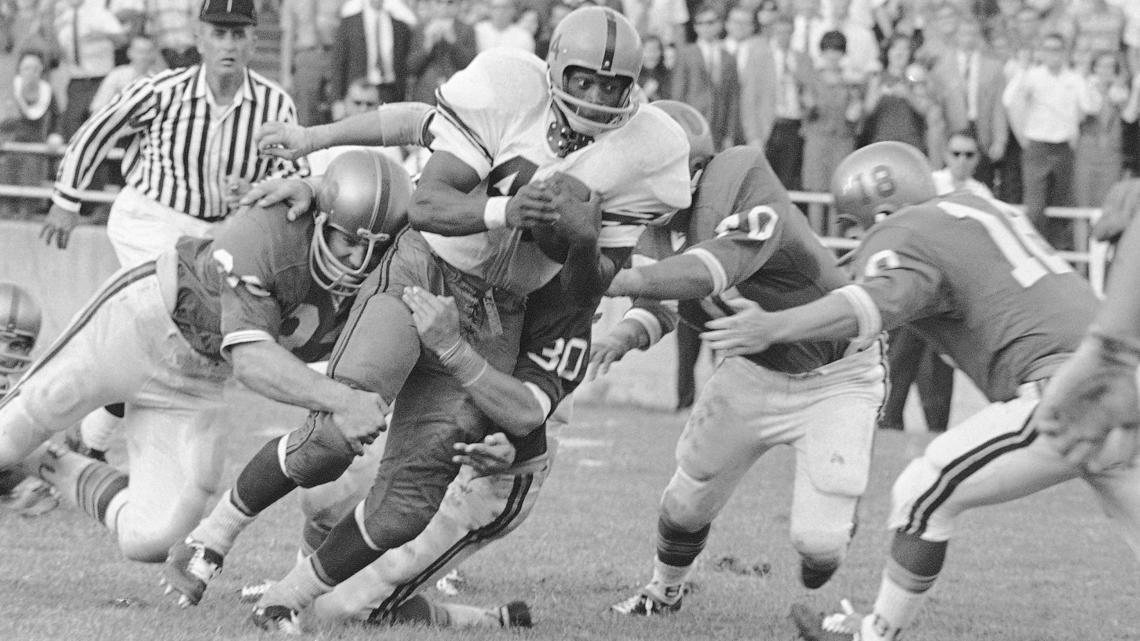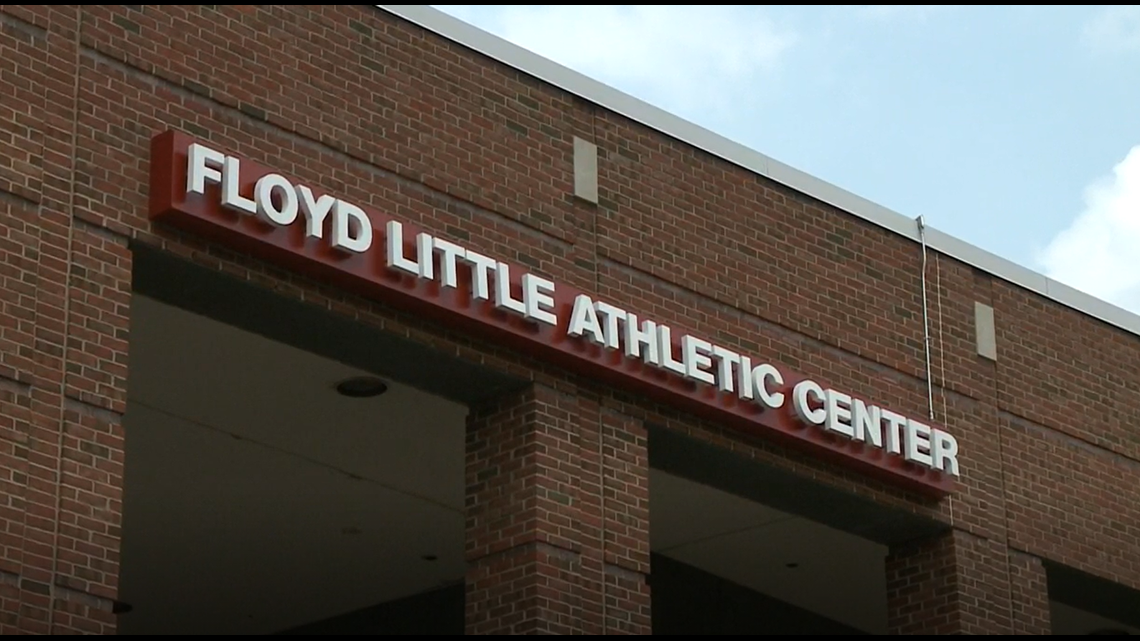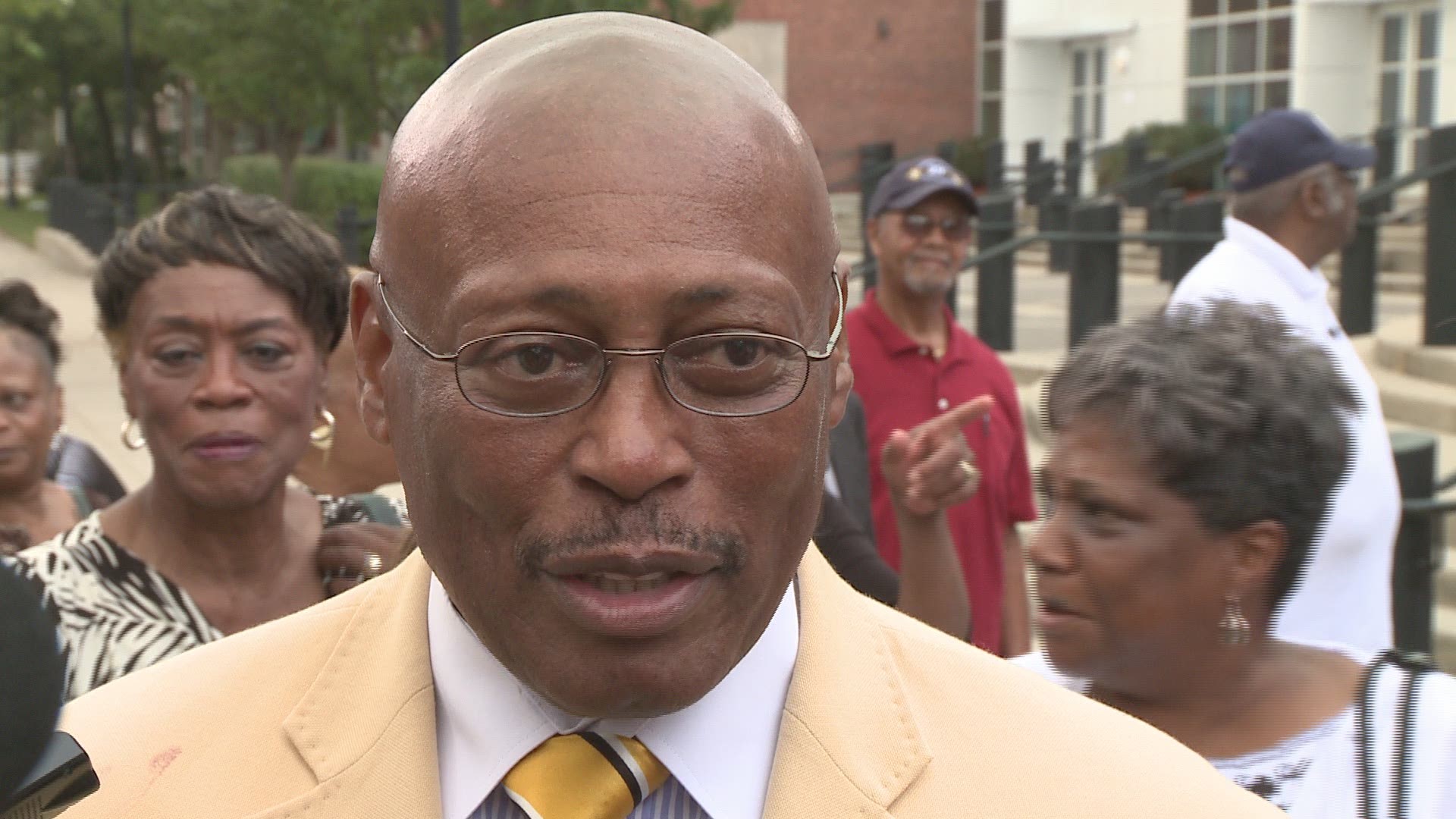NEW HAVEN, Conn. — Floyd Little, the New Haven native who became a star running back who starred at Syracuse and for the Denver Broncos, has died. He was 78.
The Pro Football Hall of Fame said he died Friday night at his home in Nevada. No cause was given.
“Floyd Little was not only a Hall of Fame running back, he was a Hall of Fame person,” NFL Commissioner Roger Goodell said. “Faith, family and football were the pillars of his life.”
Little was a three-time All-American at Syracuse, where he wore No. 44 like Jim Brown and Ernie Davis before him. From 1964-66, he ran for 2,704 yards and 46 touchdowns.
Little was the sixth overall pick in the 1967 AFL-NFL draft. He played nine seasons in Denver, where he earned the nickname “The Franchise” because his signing was credited with keeping the team from relocating and helped persuade voters to approve funds for the old, iconic Mile High Stadium, which has since been replaced by Empower Field at Mile High.
“I know when I got there the talk was about the team moving to Chicago or Birmingham,” Little told The Associated Press in an interview in 2009. “So, I supposedly saved the franchise, and I think (former team spokesman) Jim Saccomano gave me that nickname. It’s been a part of my name ever since.”
Little was elected to the College Football Hall of Fame in 1983 and the Pro Football Hall of Fame in 2010.
“Floyd Little was a true hero of the game,” said David Baker, president and CEO of the pro hall. “He was a man of great integrity, passion and courage. His contributions off the field were even greater than his amazing accomplishments he did on it. Floyd’s smile, heart and character epitomized what it meant to have a Hall of Fame life.”
A high school star in Connecticut at New Haven’s Hillhouse High, Little overlapped at Syracuse with U.S. President-elect Joe Biden, who said in a statement Saturday the pair had become friends and often spoke by phone after Orange football games.
“He was full of character, decency, and integrity,” Biden said. “He was always gracious with his time with fans — parents and grandparents who wanted to introduce their children and grandchildren to a genuine role model.”
A five-time Pro Bowler, Little led the NFL in rushing in 1971 with 1,133 yards and in touchdown runs in 1973 with 12. He also was one of the league’s best kick returners, leading the AFL in punt returns as a rookie in 1967.


During his nine-year pro career, Little rushed for 6,323 yards and 43 touchdowns and caught 215 passes for 2,418 yards and nine TDs. He had the most all-purpose yards in pro football and ranked second only to O.J. Simpson in yards rushing over his career.
After a three-decade wait, Little made it into Canton in 2010. He told the AP when he was nominated by the hall’s senior committee that he had given up hope of ever making it into the Hall of Fame.
“I was running out of guys who had seen me play,” said Little, whose career in Denver spanned the years 1967-75, lean times in the former AFL franchise’s history. “The people that had seen me play were starting to fade off and retire. All these guys were no longer there, so who’s going to talk about Floyd Little? Nobody. I thought I’d just fallen through the cracks never to be seen or heard from again.”
He was never forgotten in Denver, where the late team owner Pat Bowlen once hailed Little’s “immeasurable contributions to this franchise and the NFL.”
And he was not forgotten in his home town of New Haven.
Little was one of six kids. His father died when he was six. He was expelled from his junior high school, but went back to school and graduated from Hillhouse High.
In 2011 his alma mater renamed the New Haven Athletic Center the Floyd Little Athletic Center, after its greatest football player.


On that day he noted that after being admitted to the Hall of Fame, his fellow Syracuse alum, then-Vice President Biden, had invited him to the White House. "But this is far greater than that," said Little.
He said he was "thrilled and delighted" to "let it be known how proud I am to be from New Haven and what this means to me to have my likeness and my name associated with my community and my high school in perpetuity."
Little earned degrees from Syracuse University and the University of Denver College of Law.
During his long wait for enshrinement, Little said he was regularly approached by fans wanting him to settle a bet: Which year did he go into the Hall of Fame?
“And I have to tell them I’m not in the Hall of Fame and I’ve never even been nominated,” Little said in the months before his selection on Feb. 6, 2010.
Little decided not to get his hopes up anymore and a few years later, the senior committee nominated him, allowing him to dream anew about football immortality. On the eve of his selection, he said he’d had a premonition that his time was coming at last.
“It’s the 44th Super Bowl,” Little said in 2010. “An African-American just became our 44th president. I wore No. 44. I just feel it’s my time.”
He was right: Hall Vice President Joe Horrigan called him with the good news the day before New Orleans’ 31-17 win over Indianapolis in the Super Bowl.
“I was numb,” Little said. “I knew he wasn’t calling to tell me I was passed over again.”
Little said he learned a valuable lesson that day: “Well, you don’t give up on your dreams,” even if it’s to assuage the pain of envisioned rejection.
Little, who had sold his car dealership in Seattle after 32 years not long before his nomination, returned to Syracuse the following year as a special assistant to the athletic director, a position he held until 2016, when he received an honorary doctorate degree from the university.
After that, Little and his wife moved to Las Vegas.
An ex-teammate of Little’s at Syracuse, Pat Killorin, made Little’s cancer diagnosis public in May when he created a GoFundMe page to help the family with treatment costs.
Floyd is survived by his wife, Deborah.

